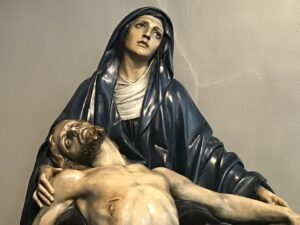We often associate inheritance with death and it is always a sadness to hear of families fighting over money. This can happen if old wounds reopen. Feelings of neglect because we were not the perceived favorite child, feelings of injustice because what our parents considered “fair” fails to line up with our sense of fairness, or feelings of fear that we will be left out, can lead to underhanded behavior. Feelings of overwhelming grief or shock due to sudden loss can lead us to argue over sentimental objects to the point of harming the relationships we have with our family that we still have with us. These behaviors come from a sense of brokenness and are a sign that we are detached from the true understanding of inheritance.
Inheritance is really about life. An inheritance comes from the incredible sacrifices a father makes so that his final offering to protect and provide for his children continues after his death. While these sacrifices of love are admirable, even more important than passing on possessions is the passing on of faith. Those good fathers who baptize their children, bring them to Sunday Mass, lead Grace at the family meal, read the Bible with their children, live the Gospel through their service to their community, whether it be assisting at Mass, volunteering to coach sports, or helping neighbors in need, pass on something even more precious than temporal goods. They pass on the gift of faith that we may inherit the eternal gifts of Paradise.
Even those who do not have the benefit of a loving human father in their lives, do have the example of Our Heavenly Father. Our Heavenly Father continually provides everything we need from the food on our tables to the air we breathe. He gifts us with the soft falling rain, the gentle breezes, the painted sunsets, the kind smiles of strangers, and the people in our lives who love us. His greatest gift of sacrificial love is the gift of His Son who opened the gates of Paradise for us.
God challenges us to change our perspective. When King David writes in Psalm 16, “You are my inheritance, O Lord,” he writes in the present tense. Choosing God as our inheritance means we live in His Divine Will now. Our first concern becomes what is pleasing to Him. We rid ourselves of our vanity and selfishness that only leads to dissatisfaction and depression by directing our vision outward toward serving the needs of others. We diminish our list of unnecessary wants by practicing gratitude for the gifts we have. We let go of our illusion that we are in control when we trust that everything we need will be provided and everything that comes to us will be used by God to perfect us and this leads us to become secure and at peace. Ultimately, choosing God as our inheritance brings us riches far beyond temporary earthly treasures. Choosing God as our inheritance means we can experience the fullness of joy that can only be experienced in His presence, a joy that can begin now and last into eternity.






What a beautiful reminder of our divine inheritance! Thank you, LisaMarie